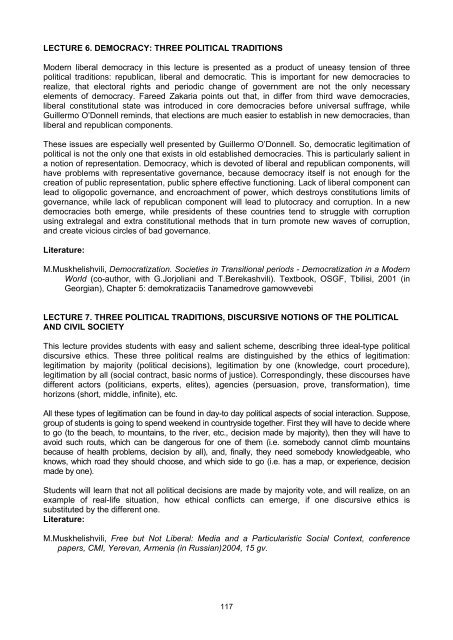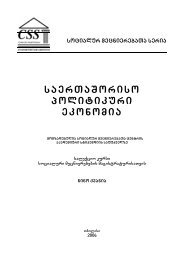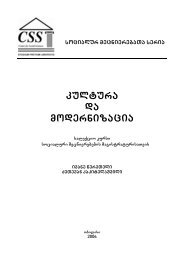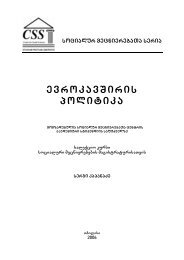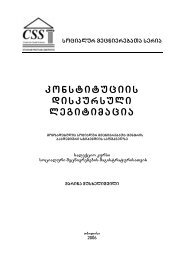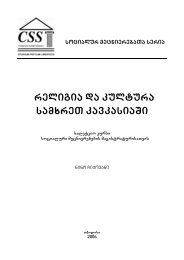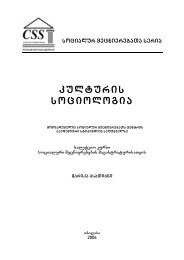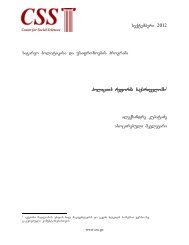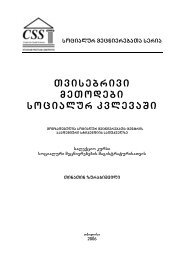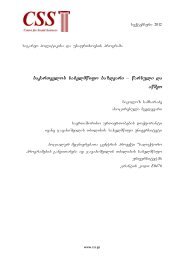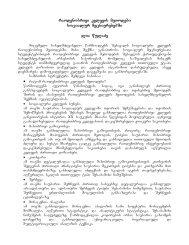samoqalaqo sazogadoeba - Center for Social Sciences
samoqalaqo sazogadoeba - Center for Social Sciences
samoqalaqo sazogadoeba - Center for Social Sciences
You also want an ePaper? Increase the reach of your titles
YUMPU automatically turns print PDFs into web optimized ePapers that Google loves.
LECTURE 6. DEMOCRACY: THREE POLITICAL TRADITIONS<br />
Modern liberal democracy in this lecture is presented as a product of uneasy tension of three<br />
political traditions: republican, liberal and democratic. This is important <strong>for</strong> new democracies to<br />
realize, that electoral rights and periodic change of government are not the only necessary<br />
elements of democracy. Fareed Zakaria points out that, in differ from third wave democracies,<br />
liberal constitutional state was introduced in core democracies be<strong>for</strong>e universal suffrage, while<br />
Guillermo O’Donnell reminds, that elections are much easier to establish in new democracies, than<br />
liberal and republican components.<br />
These issues are especially well presented by Guillermo O’Donnell. So, democratic legitimation of<br />
political is not the only one that exists in old established democracies. This is particularly salient in<br />
a notion of representation. Democracy, which is devoted of liberal and republican components, will<br />
have problems with representative governance, because democracy itself is not enough <strong>for</strong> the<br />
creation of public representation, public sphere effective functioning. Lack of liberal component can<br />
lead to oligopolic governance, and encroachment of power, which destroys constitutions limits of<br />
governance, while lack of republican component will lead to plutocracy and corruption. In a new<br />
democracies both emerge, while presidents of these countries tend to struggle with corruption<br />
using extralegal and extra constitutional methods that in turn promote new waves of corruption,<br />
and create vicious circles of bad governance.<br />
Literature:<br />
M.Muskhelishvili, Democratization. Societies in Transitional periods - Democratization in a Modern<br />
World (co-author, with G.Jorjoliani and T.Berekashvili). Textbook, OSGF, Tbilisi, 2001 (in<br />
Georgian), Chapter 5: demokratizaciis Tanamedrove gamowvevebi<br />
LECTURE 7. THREE POLITICAL TRADITIONS, DISCURSIVE NOTIONS OF THE POLITICAL<br />
AND CIVIL SOCIETY<br />
This lecture provides students with easy and salient scheme, describing three ideal-type political<br />
discursive ethics. These three political realms are distinguished by the ethics of legitimation:<br />
legitimation by majority (political decisions), legitimation by one (knowledge, court procedure),<br />
legitimation by all (social contract, basic norms of justice). Correspondingly, these discourses have<br />
different actors (politicians, experts, elites), agencies (persuasion, prove, trans<strong>for</strong>mation), time<br />
horizons (short, middle, infinite), etc.<br />
All these types of legitimation can be found in day-to day political aspects of social interaction. Suppose,<br />
group of students is going to spend weekend in countryside together. First they will have to decide where<br />
to go (to the beach, to mountains, to the river, etc., decision made by majority), then they will have to<br />
avoid such routs, which can be dangerous <strong>for</strong> one of them (i.e. somebody cannot climb mountains<br />
because of health problems, decision by all), and, finally, they need somebody knowledgeable, who<br />
knows, which road they should choose, and which side to go (i.e. has a map, or experience, decision<br />
made by one).<br />
Students will learn that not all political decisions are made by majority vote, and will realize, on an<br />
example of real-life situation, how ethical conflicts can emerge, if one discursive ethics is<br />
substituted by the different one.<br />
Literature:<br />
M.Muskhelishvili, Free but Not Liberal: Media and a Particularistic <strong>Social</strong> Context, conference<br />
papers, CMI, Yerevan, Armenia (in Russian)2004, 15 gv.<br />
117


